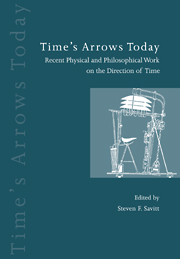Book contents
- Frontmatter
- Contents
- Preface
- Notes on the contributors
- Introduction
- PART 1 Cosmology and time's arrow
- 1 Time, gravity, and quantum mechanics
- 2 Cosmology, time's arrow, and that old double standard
- PART 2 Quantum theory and time's arrow
- PART 3 Thermodynamics and time's arrow
- PART 4 Time travel and time's arrow
- References
- Index
2 - Cosmology, time's arrow, and that old double standard
Published online by Cambridge University Press: 26 January 2010
- Frontmatter
- Contents
- Preface
- Notes on the contributors
- Introduction
- PART 1 Cosmology and time's arrow
- 1 Time, gravity, and quantum mechanics
- 2 Cosmology, time's arrow, and that old double standard
- PART 2 Quantum theory and time's arrow
- PART 3 Thermodynamics and time's arrow
- PART 4 Time travel and time's arrow
- References
- Index
Summary
A century or so ago, Ludwig Boltzmann and others attempted to explain the temporal asymmetry of the second law of thermodynamics. The hard-won lesson of that endeavour – a lesson still commonly misunderstood – was that the real puzzle of thermodynamics is not why entropy always increases with time, but why it was ever so low in the first place. To the extent that Boltzmann himself appreciated that this was the real issue, the best suggestion he had to offer was that the world as we know it is simply a product of a chance fluctuation into a state of very low entropy. (His statistical treatment of thermodynamics implied that although such states are extremely improbable, they are bound to occur occasionally, if the universe lasts a sufficiently long time.) This is a rather desperate solution to the problem of temporal asymmetry, however, and one of the great achievements of modern cosmology has been to offer us an alternative. It now appears that temporal asymmetry is cosmological in origin, a consequence of the fact that entropy is much lower than its theoretical maximum in the region of the Big Bang – i.e., in what we regard as the early stages of the universe.
The task of explaining temporal asymmetry thus becomes the task of explaining this condition of the early universe. In this chapter I want to discuss some philosophical constraints on the search for such an explanation. In particular, I want to show that cosmologists who discuss these issues often make mistakes which are strikingly reminiscent of those which plagued the nineteenth century discussions of the statistical foundations of thermodynamics.
- Type
- Chapter
- Information
- Time's Arrows TodayRecent Physical and Philosophical Work on the Direction of Time, pp. 66 - 94Publisher: Cambridge University PressPrint publication year: 1995
- 2
- Cited by



